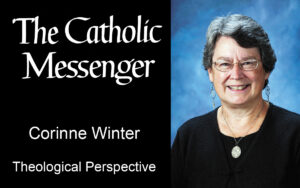During these past few weeks we celebrated a feast and a memorial that lead us to think of Mary as we often find her pictured — standing triumphant atop a cloud, wearing or receiving a crown and surrounded by angels. The feast, of course, is that of the Assumption, which we celebrated Aug. 15. We celebrate our belief that Mary already enjoys the fruits of Christ’s death and resurrection. She is united, in her whole person, “body and soul,” with God, for all eternity. One week later, on Aug. 22, we find the memorial of “Mary Queen of Heaven.” Since the Feast is a holy day and the memorial is simply marked by a few prayers at daily Mass, we are likely much less familiar with the latter, although we know the title for Mary from the glorious mysteries of the rosary and from hymns, including the Regina Coeli which is often sung during the Easter season.
 These two liturgical celebrations and their content are prime examples of the development of our faith through the process of Tradition. We find a feast of Mary on Aug. 15 in parts of the Catholic world at least as early as the fifth century. Perhaps due to the custom of remembering saints on the anniversary of their death, the feast was sometimes called Mary’s Dormition of falling asleep. Art, hymnology, poetry and homilies of the fifth century and beyond bear witness to the conviction of many Christians that the body that bore the Son of God did not suffer decay. Quite a few even suggest that Mary did not actually die, although that idea did not become part of the defined dogma and remains open to theological reflection.
These two liturgical celebrations and their content are prime examples of the development of our faith through the process of Tradition. We find a feast of Mary on Aug. 15 in parts of the Catholic world at least as early as the fifth century. Perhaps due to the custom of remembering saints on the anniversary of their death, the feast was sometimes called Mary’s Dormition of falling asleep. Art, hymnology, poetry and homilies of the fifth century and beyond bear witness to the conviction of many Christians that the body that bore the Son of God did not suffer decay. Quite a few even suggest that Mary did not actually die, although that idea did not become part of the defined dogma and remains open to theological reflection.
The queenship of Mary is not defined as a dogma but is deeply rooted in the church’s spiritual and liturgical tradition of honoring Mary due to her role in the work of Jesus Christ. It seems natural that the mother of the King would be honored as Queen. The hymn mentioned above, which calls on Mary to rejoice in the resurrection of her son, dates from the 11th or 12th century. The mysteries of the rosary can be dated from at least the 16th century. Pope Pius XII instituted a feast of Mary Queen of Heaven in 1954 on the 100th anniversary of the dogma of the Immaculate Conception and four years after the declaration of the dogma of the Assumption.
So how are these celebrations relevant in today’s world? The paintings and poetry may seem dated at least to some. Even the title “queen” may not be attractive within our own times and culture. Some associate the idea with a certain triumphalism and even with a kind of exclusivist notion of the church itself as God’s kingdom versus the evil rest of the world. But since the Second Vatican Council, the church calls us to join our reflections on Mary with a commitment to human dignity and to hope for the world. And those are concepts clearly needed here and now.
A queen, whether of a nation or of a county fair, is often viewed as a representative of the ideals of the people who crown her. Recent theology has recognized that we can claim very little knowledge of Mary’s own life or activities. Therefore, imitating her, in the sense of doing as she did is unrealistic. But we can reflect on what she has come to stand for in our community, with the ideals we have attributed to her: fidelity to Christ, purity of heart, openness to the Spirit and to the Word of God.
The dogma of the Assumption is a sign of the dignity and ultimate destiny of the whole human person. St. Augustine, writing in the fifth century, exhorted Christians to understand that all are called to bear Christ just as surely as Mary did, although in a different way. The church teaches further, that every person is destined to share fully in the work and the victory of Christ, just as Mary does. How, then, can we deny the dignity of any person; poor or rich, of the same or different race or ethnicity, CEO or refugee? Our world cries out for us to respect every person.
(Corinne Winter is a professor-emerita of St. Ambrose University, Davenport.)











